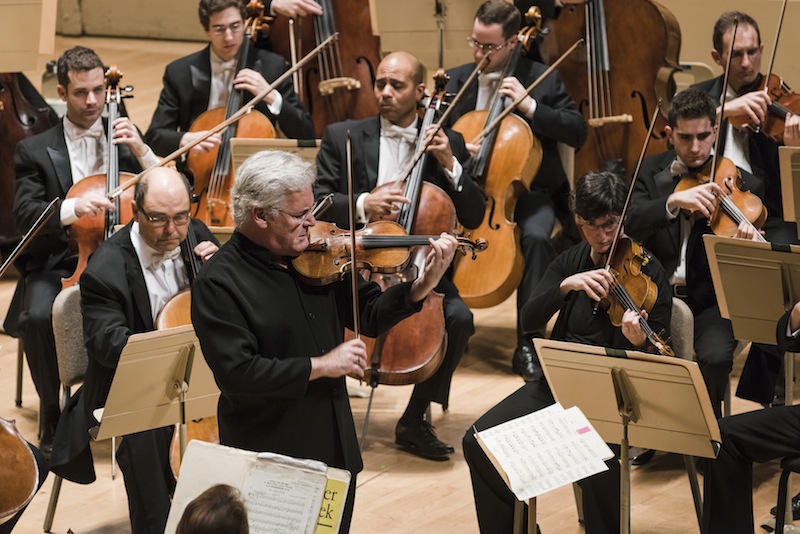Zukerman leads BSO in refined Classical style

Pinchas Zukerman performed as conductor and violin soloist with the BSO Thursday night. Photo: Liza Voll
Mozart may not have been the focus of Thursday night’s concert by the Boston Symphony Orchestra, but the composer’s influence was keenly felt in two beloved works by Tchaikovsky and Schubert.
Tchaikovsky sought to emulate Mozart’s lean, muscular style in several works, the most popularof which is his Serenade for Strings. And Schubert, an adamant admirer of Mozart while a teenager, caught elements of the composer’s style in his sweet and effervescent Fifth Symphony.
Both the Tchaikovsky and Schubert works were the focus of Thursday night’s concert, which was led by Pinchas Zukerman.
In front of the orchestra, Zukerman is all business, rarely taking time to acknowledge applause before leaping directly into the music. (Several in the audience clapped between the movements of the Tchaikovsky, which perhaps explains Zukerman’s aloof presence.) He led with broad strokes to craft the musical phrases into larger structures, but he kept a close ear to the finer details of the music.
That was especially the case in the waltz from the Serenade for Strings. Zukerman kept the music moving at a lilting tempo and took care to set the trickling lines of the violins and cellos against each other, crafting the sound with gentle waves of his hand as if to caress the phrases as they passed by.
The BSO string responded with rapt attention. The first movement, while modeled on Mozart’s elegance, is thoroughly Tchaikovsky, thick with filigree and sweeping melodies that change moods on a dime. The ensemble, with violins set up antiphonally and double basses sitting in the center of the stage, played with rich and penetrating tone.
The elegiac third movement was especially gorgeous, unfolding in sheets of glowing sound, and the finale, with its quotation of Russian folk tunes, moved with rustic charm.
The performance of Schubert’s Fifth Symphony was nimble, even fleet under Zukerman’s guidance, and the outer movements churned with a sense of vitality and authority. Zukerman led the second movement with big, loving strokes, taking time to shape the movement’s sudden key changes with subtle dynamic weight.
The musicians dug in for the Menuetto to add verve to Schubert’s propulsive writing. Zukerman pulled back on the tempo for the Trio. But when the minuet theme returned, the music never regained its initial vitality, try as Zukerman might with punctuated gestures and well-placed foot stomps.
Prior to the symphony, Zukerman led the BSO in an Edward Elgar rarity, the Chanson de nuit, which was heard in its first BSO performance since 1905.
Written initially as a solo piece for violin and piano, Chanson de nuit, in its orchestral version, retains the salon quality and somber intimacy of the original. The piece is characteristic Elgar, complete with flowering melody and the slow forward momentum of the familiar Pomp and Circumstance marches.
Zukerman led playing of soft radiance from the ensemble to make a strong case for this charming work. Let’s hope the BSO doesn’t wait 110 more years before programming this piece again.
The first half of the concert featured two short works by Tchaikovsky that spotlighted Zukerman as violin soloist.
Tchaikovsky’s Mélodie and Sérénade mélancolique, both heard in their first BSO performances in Symphony Hall, feature long, languid melodies for the soloist and ensemble.
These works, known to Zukerman aficionados through his recording with Zubin Mehta and the Israel Philharmonic, proved fine vehicles for the violinist to show off his tender musical phrasing. While many commentators have noted that his technical facility on the violin is not what it once was, his sense of the singing line remains strong. His tone is beautiful and colorful, ranging from rosy amber hues to bright sounds in the upper register.
Zukerman’s amber-laced phrases brought a palpable intensity to the dolorous line of Sérénade mélancolique, while the Mélodie featured the violinist in lines of lush silver as he built the melodies to a singing trill. In both pieces, the orchestra offered soft support through tasteful rubato and dynamic shading.
The program will be repeated 1:30 p.m. Friday and 8 p.m. Saturday at Symphony Hall. bso.org; 888-266-1200
Posted in Performances




